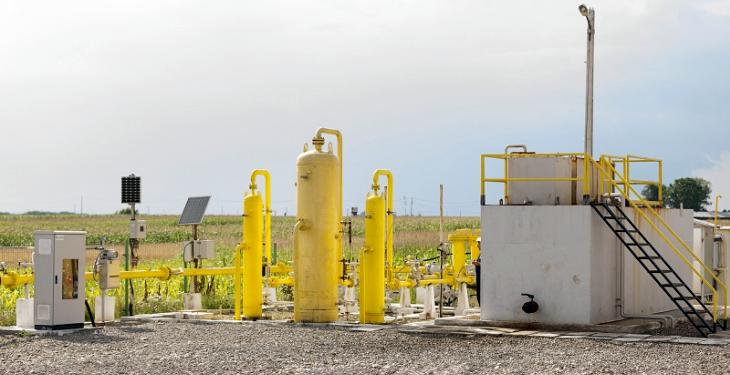A draft order of the National Agency for Mineral Resources (NAMR), published on January 19th, establishes that the royalties for gas extracted from Romania will be calculated and paid monthly on the basis of a formula based on the average price in the previous month from Central European Gas Hub (CEGH hub at Baumgarten, Austria). Currently, royalties are between 3.5% and 13%, depending on the production of the deposit, which is applied to the value of the output.
According to the central press, ANRM’s new order is to amend an order from 2008, which established that the reference value (the price) at which the royalty is paid is 495 lei / 1,000 cubic meters. This price is to be abrogated, and the new price charged is to derive from the formula that takes into account the price in the CEGH.
In the past, the Court of Accounts accused NAMR of collecting the royalty calculated at the reference price of 495 lei per 1,000 cubic meters, which was not updated, and asked the institution to modify the legislative framework for updating that price. Subsequently, NAMR announced that it has entered into a consultancy contract with the Petroleum and Gas University of Ploiesti on “Research and technical expertise for establishing the reference price of natural gas extracted in Romania”, so that on the basis of these results it will establish the price at which the royalty collected by the state is to be applied. After several additional requests and reviews, NAMR decided that the reference price should be based on a formula taking into account the CEGH price, in conjunction with the upper calorific value and the extracted volume.
The value of 495 lei lead to a price of 45.71 lei/MWh. Dumitru Chisăliță, an independent expert on the gas market, believes that “compared to the price resulted from NAMR’s old order would lead to an increase of about 75% in the royalty.” “We have two gas exchanges in Romania, why not using the prices formed domestically? Gas from domestic production is also traded, and also gas from storage and imported gas. It would a bad signal”, the analyst quoted economica.net said.
In turn, Harald Kraft, chairman of the ROPEPCA, says that there is no need for a new reference price for the calculation of royalties on gas because producers pay the royalty at market price. He considers that “any form of abuse is excluded” in the case of intra-group gas sales.
“ANRM has technical instructions that tell us very clearly how the royalties are calculated, and this is the higher price between the selling price and the reference price. Industry has fully respected this. We are audited, and these things are checked. Senator Daniel Zamfir said that the reference price is low (45.71 lei/MWh, given that in the market the producers sell the gas with 89 lei/MWh, e.n.), and this statement created the impression in public that we pay the royalty at the reference price, which is more than half the market price. This is not true. We pay the royalty at market price”, Kraft said in an interview in the Bursa daily.
ROPEPCA: There is no need for a reference price
“We are in talks with NAMR to get the right regulation. In my opinion, there is no need for a reference price. Why? Because we are forced to pay the royalty at the market price and, voluntarily, no producer will sell at a lower artificial price, because that’s how the economy works, everybody wants to sell at a market price as high as possible. The price hub you refer to does not reflect the realities of the domestic market. At present, Romania does not export gas, so it is not actually linked to the European market, the relevant prices being those resulted from local transactions… The discussion is how to set the reference price, if there is still a reference price. In our opinion, the reference price should be equal to the price on the Romanian market; we cannot take any quotes from Baumgarten (Central European Gas Hub AG – CEGH) or from Western Europe. The realities of the local market are different and must be taken into account. We do not sell gas to the hub, for now. For such a situation, a new methodology can be set, perhaps clearer than the current set of regulations. Therefore, I disagree that OPCOM to have a monopoly in setting the price, nor should we be obliged to sell most of the production on the exchange”, Kraft also said, referring to the amendments to the law for approving GEO 64/2016 in the Commission of Industries in the Chamber of Deputies.
